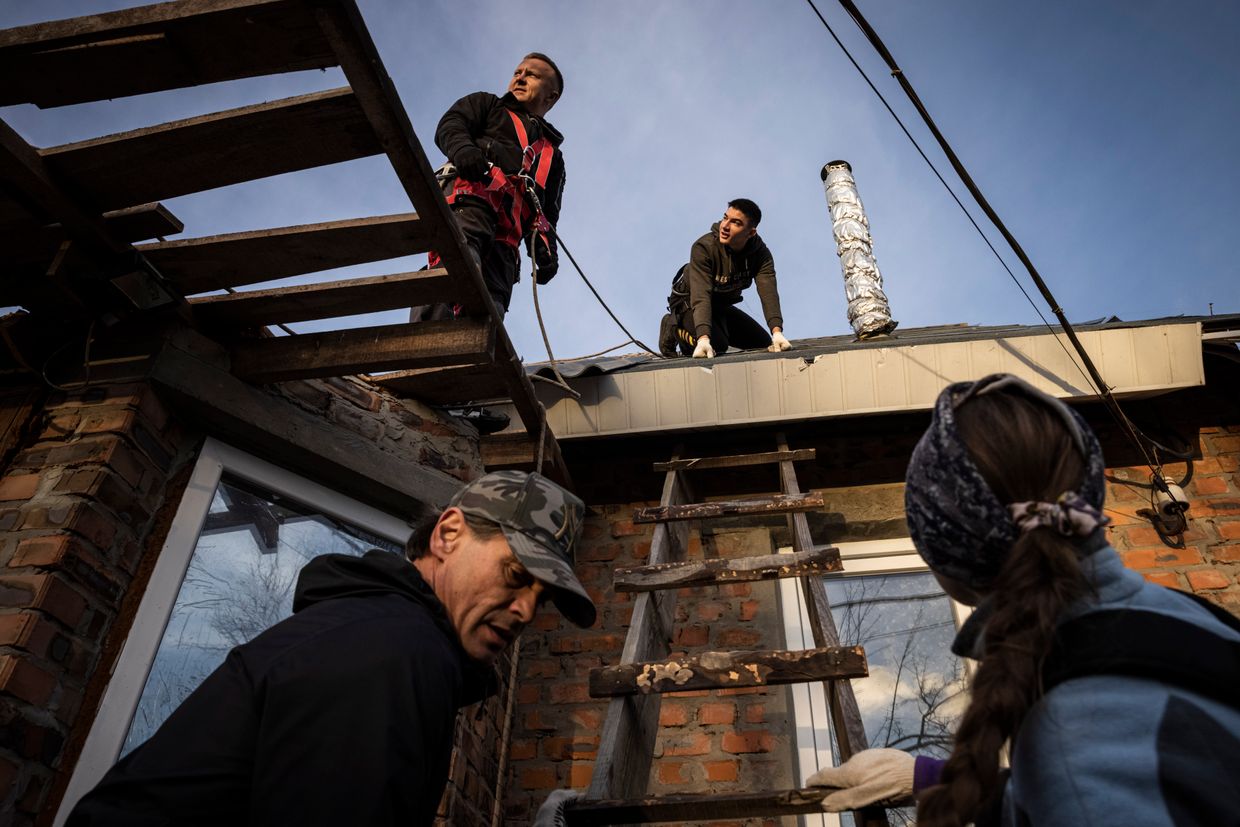Ukraine courts big foreign investors but leaves smaller players behind

In the last year, Ukraine's government has accelerated efforts to paint the country as a bankable foreign investment destination to help with its $524 billion recovery needs — but it’s overlooking smaller investors in favor of the financial elite.
Most of the advertised projects, like industrial parks and energy facilities, are geared towards cash-rich companies and international financial institutions (IFIs) that can take on bigger risks. Smaller foreign investors and businesses are largely left out of the equation.
As a result, they are fighting an uphill battle to secure capital and want greater government support to set up shop in Ukraine.
Ukraine is more interested in IFI loans and state-led reconstruction, said economist Daniil Monin, adding that it's an approach that sidelines small and medium-sized businesses. State tenders are hard to access and opaque, while donor funds are mostly only accessible by big players, he said.
Before Russia’s full-scale invasion, smaller businesses abroad could comfortably tap into their banks for loans and financing instruments to invest in Ukraine. But Russia’s ongoing invasion and indiscriminate attacks have scared European and American banks into slamming the door on companies and private investors.
Ukrainian banks are an option, but investors are put off by the sky-high interest rates that hover around 18-19%. Most foreign investors are also shut out from Kyiv’s domestic subsidy programs, even if they join forces with Ukrainian businesses.
RSJ Investments, a Czech firm that invests in small-scale energy projects, told the Kyiv Independent that it can’t apply to a state support fund for its renewable energy project in Ukraine, despite investing around $3 million during the war, paying taxes, and partnering with a Ukrainian company.
"The government is telling (Ukrainian companies) it’s not good to attract a foreign investor during the war because now your joint company cannot apply for our support programs," the company’s asset manager, Jakub Kucera, told the Kyiv Independent. He goes as far as describing Ukraine's barriers to smaller investors as "discriminatory."
The fund, called the Decarbonization Fund, offers favorable loans at a 7-9% interest rate and 90% CAPEX coverage to companies and state entities for energy-efficient projects. The maximum allowance per project, 90 million hryvnia ($2.2 million), would allow the company to build up to five new plants and double its heat production in Kyiv and Kyiv Oblast.
Unless the subsidy programs are injected with international funds, cash-strapped Ukraine is unlikely to offer them to foreigners. Ukrainian businesses are the priority since they can’t tap external financing like their foreign counterparts, former Ukrainian MP and energy expert Viktoriya Voytsitska told the Kyiv Independent.
"Only if surplus funds become available should this opportunity be extended to foreign investors," she said.

Foreign investment ambitions
To coax foreign investors, Kyiv and its partners have rolled out projects like the sleek online "Investment Map" in 2023, where users can check 195 proposals across 14+ industries in different regions. Down the line, the much hyped U.S.-Ukraine Reconstruction Investment Fund could be a blueprint for foreign investment, once the details are ironed out in a meeting in Kyiv next month.
The government also promises foreign investors tax benefits, like no income tax payments for up to five years, if they invest over 12 million euros. This jumps up to 10 years tax-free if the investor pumps money into areas that the government has designated a priority zone for development.
Ukraine has seen some big-ticket success stories recently. French billionaire Xavier Niel inked a $650 million deal last September after acquiring and merging Ukraine’s third-largest mobile operator Lifecell with service provider Datagroup-Volia.
But looking around, there are few smaller and mid-sized players because there is no clear framework for them unless they have deep pockets and the risk appetite to do the job on their own. Most are waiting on the sidelines for the war to end.
Ukraine’s National Bank notes that foreign investment tumbled to $1.1 billion in the first half of the year compared to $3.3 billion in the same period last year — a 67% plunge that reflects foreign investors' trepidations.
RSJ Investments is a rare case of a smaller company expanding its business during the war. As well as frustrations over the Decarbonization Fund, the company says plans like the U.S. investment fund are just another path for the "big guys" rather than companies like them.
Serhii Tsivkach, senior advisor at DGA- Albright Stonebridge Group, a consultancy, agrees that Kyiv and foreign governments should do more to support smaller businesses and investors from abroad.
These investors can help introduce innovative technologies and open up new markets to Ukrainian small and medium-sized companies (SMEs), he added.
Unlocking Capital
Left with few other options, RSJ Investments is now in talks with Ukrainian banks for a commercial loan. The inflation-driven interest rates of 18-19% will mean the company can only afford two new plants instead of five. If the loan falls through, then the company won’t build anything, said Kucera.
The only good news is that Ukrainian banks now have guarantee programs backed by the European Bank for Reconstruction and Development and the European Investment Bank. This means RSJ Investments doesn’t need to pledge any assets outside of the project itself — an earlier requirement for borrowing in Ukraine.
Looking ahead, foreign banks need a confidence boost so that they can lend to companies and investors, Jock Mendoza-Wilson, joint chair of the British-Ukraine Chamber of Commerce, told the Kyiv Independent.
"A bank will simply see war risk. When you see war risk, you won't see access to capital," Mendoza-Wilson said.
The best path for smaller players would be an insurance policy protecting investors against war risks, underwritten by a government either on its own or in tandem with private insurance companies, said Mendoza-Wilson. This would make it much easier for SMEs to borrow money from banks.
Another issue is that foreign banks blanket Ukraine as one risk level, without recognizing that some regions in the center and west face lower risks than others. Governments could provide more nuanced investment guidelines to help foreign banks identify safer areas and counter the perception that Ukraine is a total no-go zone for investment, said Mendoza-Wilson.
"(Governments need to) encourage positive lending behavior and bust negative myths," he said.
"If you're successful, manage the process well and have a good business model, then the return on capital invested in Ukraine could well be significantly higher than you'd get in somewhere like the U.K."
Note from the author:
Hi, it’s Dominic, thank you for reading this story. Many of our readers have asked me how they can invest in Ukraine now. While there are opportunities, there are still many barriers to investing in Ukraine during the war. That doesn't mean there won't be changes in the future, and there are already some good examples. To help us keep bringing you stories like this, please consider joining our community for as little as a cup of coffee a month.













